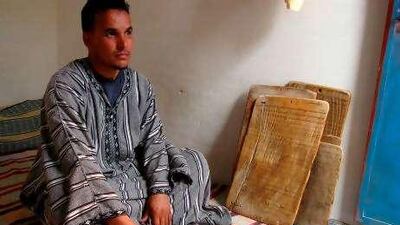TAZEMOURT // The sun was setting over this southern Moroccan village and in his room above the local mosque, Abderrahim Oulgoum's thoughts turned to a subject far removed from his Quranic law studies: football.
"It's the World Cup final today," said Mr Oulgoum, 34. "The whole village is going to be watching down in the café." The championship match was a rare, lighthearted diversion for Mr Oulgoum, a student at one of Morocco's hundreds of madrassas - traditional schools specialising in Quran memorisation and Islamic practice. While the government sees madrassas as vehicles for religious moderation, the rigour and austerity of the madrassa lifestyle are causing some younger Moroccans to think twice about attending.
"For example, today I got up 3.30am to read," Mr Oulgoum said. "Then fajr prayer, then bread and olive oil for breakfast, then more studying. Around midday I brought food, lentils this time, to poor people." He crossed the roof terrace of the compound to a balustrade. Below, the village was drowsing in the stillness of a summer evening. The houses were shut, the streets were empty and the village taxi, a pea-green Mercedes, was parked at the crossroads with the arm of its driver dangling from the window. Downstairs, Mr Oulgoum's teacher of 10 years, Sheikh Brahim Agourrame, was stirring a pot of vegetables.
"Today is Lailat al Isra wal Miraj, so I've been fasting," Sheikh Brahim said, referring to the Night Journey when, according to Islamic tradition, the Prophet Mohammed ascended to heaven and returned to Earth. The sheikh is an amiable wisp of a man with a quick smile displaying teeth and spaces where teeth used to be. He is 85 and was born in Tazemourt, a farming community of about 2,000 in Morocco's Souss plain. Since 1991 he has led prayers at the mosque and taught at the adjoining madrassa.
"You start by memorising the Quran and mastering Arabic if you want to be a faqih," or Islamic jurist, said Sheikh Brahim, who currently has 19 students in addition to Mr Oulgoum. Five days a week, they crowd a study room equipped with cushions, a sheepskin rug, a table piled with books and a blackboard scrawled with exercises in classic Arabic grammar. The sheikh and his students appear to live quiet lives. However, teachers such as Sheikh Brahim have become an object of concern to outsiders. Some observers, particularly western ones, treat madrassas as synonymous with venues for indoctrinating children in violent extremism.
That is far from the case in Morocco, where most people espouse a relaxed faith tinged with local Sufi traditions, and King Mohamed VI is by law the highest religious authority. "Generally faqihs have a moderate orientation towards Islam, like the majority of Moroccans," said Katherine Hoffman, an associate professor of anthropology at Northwestern University in the United States, who has conducted extensive field research in Morocco.
The government is taking no chances. It has tightened its control of religious institutions since the September 11 attacks and the 2003 suicide bombings in Casablanca. A law was passed in 2002 to regulate Islamic education. Since 2006, the Islamic affairs ministry has sought to extend a national curriculum to Morocco's more than 500 mainly private madrassas, said a ministry education official, speaking anonymously because he was unauthorised to speak to the media.
In 2008, police temporarily closed dozens of private Quranic schools associated with Sheikh Mohamed Maghraoui, a scholar in Marrakech who issued a fatwa on his website defending marriage for girls as young as nine. "We promote an open-minded instruction," the ministry official said. "We want students equipped to deal with contemporary issues, with the Quran and Sunna as their starting point." Sheikh Brahim said it was getting harder to coax young students away from the lure of a modern lifestyle.
"Kids today just aren't interested in studying here. They all want cars and things," he said, dismissively waving his hand. Mr Oulgoum is an exception. "My goal is to become a faqih like Sheikh Brahim," he said. "I see how students come and ask his advice, and I'd like to be in that role." But like many young Moroccans, Mr Oulgoum also hopes to work in Europe. "Ideally as an imam in France. But if there are better possibilities in Morocco, I'd want to stay here." For now, that looks difficult. While the Islamic affairs ministry increasingly offers stipends to faqihs, they have traditionally lived off modest wages from local municipalities.
As the sun dipped to the horizon, talk of Mr Oulgoum's future gave way to more immediate concerns. He suddenly glanced at his watch, then hurried off to catch the end of the World Cup. At that moment, the call sounded for the Maghrib, the sunset prayer. Sheikh Brahim ate a bowl of soup and donned a snow-white jellaba. Around the corner, a dozen boys and men were packed into a café, lit by a flickering television where Spain and Holland were tied at zero. As the seconds in regulation time ticked away, Mr Oulgoum leapt up and dashed for the mosque, missing Spain's extra-time victory but fulfilling his obligation to pray.
@Email:foreign.desk@thenational.ae

